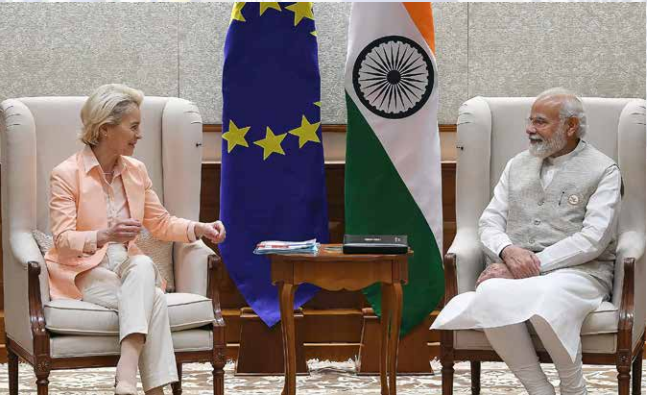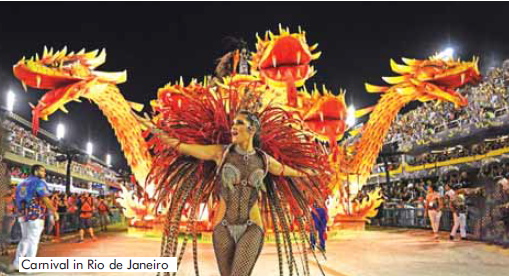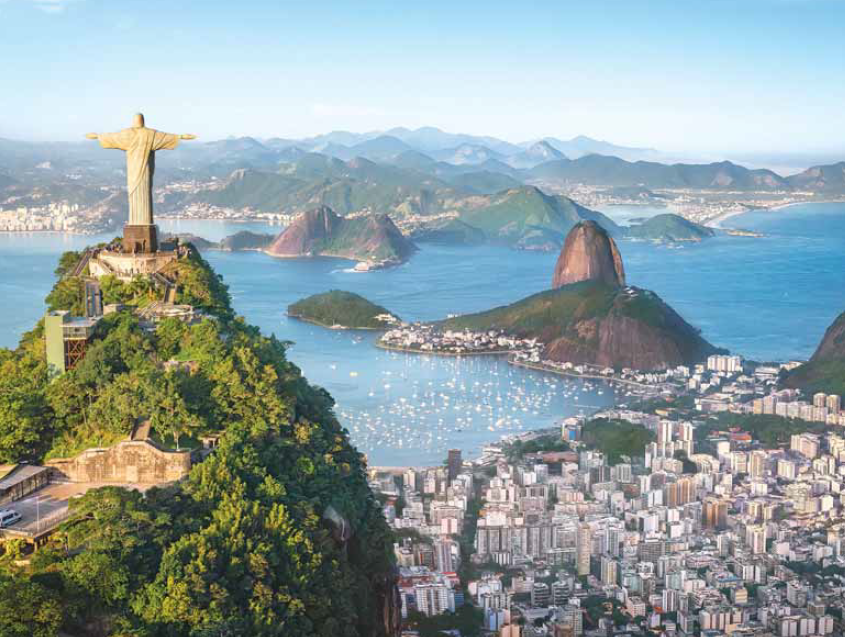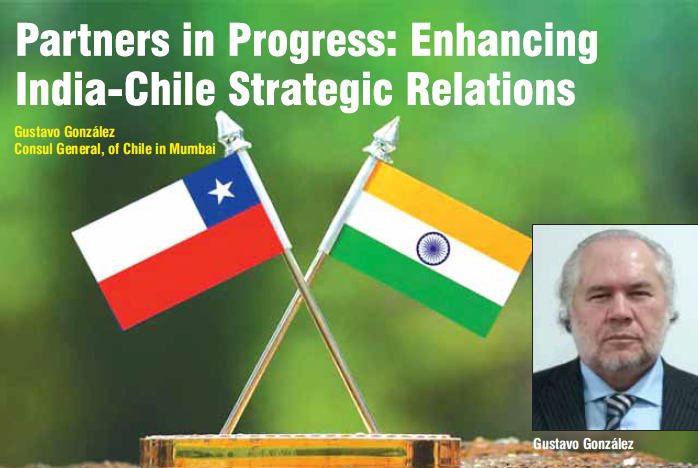Relations between India and Russia are rooted in history, mutual trust and mutually beneficial cooperation. This is a strategic partnership that has withstood the test of time, and which enjoys the support of the people of both countries, says Ivor Vaz
IF THERE HAS EVER BEEN a longstanding and time-tested partner for India, it is Russia. The development of India-Russia relations has been a key pillar of India’s foreign policy. Since the signing of ‘Declaration on the India-Russia Strategic Partnership’ in October 2000 (during the visit of Russian President Vladimir Putin to India), India-Russia ties have acquired a qualitatively new character with enhanced levels of cooperation in almost all areas of the bilateral relationship including political, security, trade and economy, defence, science and technology, and culture. Under the Strategic Partnership, several institutionalised dialogue mechanisms operate at both political and official levels to ensure regular interaction and follow up on cooperation activities. During the visit of the Russian President to India in December 2010, the Strategic Partnership was elevated to the level of a ‘Special and Privileged Strategic Partnership’.
Political Relations Annual Summit: The Annual Summit meeting between the Prime Minister of India and the President of the Russian Federation is the highest institutionalised dialogue mechanism in the strategic partnership between India and Russia. So far 17 Annual Summit meetings have taken place alternatively in India and Russia. Russian President Vladimir Putin visited Goa from 15-16 October 2016 for the 17th Annual Summit, which resulted in 19 documents related to cooperation in defence, space, information security, foreign policy, trade & investment, hydrocarbons, shipbuilding, railways, and science and technology. Indian Prime Minister Narendra Modi and Putin also adopted a Joint Statement ‘Partnership for Global Peace and Stability’ and a ‘Roadmap of Events’ to celebrate the 70th anniversary of the establishment of the diplomatic relations between India and Russia in the year 2017. Earlier, the two leaders held a bilateral meeting on the sidelines of the SCO Summit in Tashkent (Uzbekistan) on 24 June 2016. Modi visited Russia in June 2017 for the 18th Annual Summit, which took place in St. Petersburg and resulted in the conclusion of 12 documents related to cooperation over a very wide range of activities. The 18th Summit also witnessed the adoption of the ‘St. Petersburg Declaration’ which not only highlights the multi-faceted cooperation between the two countries but also provides a comprehensive matrix for future cooperation. During this visit, Modi had a separate meeting with governors of sixteen Russian regions where they discussed various aspects related to the enhancement of cooperation between Indian and Russian regions. He also participated in the St. Petersburg International Economic Forum as the Guest of Honour. Subsequently, Modi and Putin also met at the sidelines of Astana SCO summit in June 2017 and G20 Summit in Hamburg in July 2017.
Intergovernmental Commissions: There is regular high-level interaction between the two countries. Two Inter-Governmental Commissions – one on Trade, Economic, Scientific, Technological and Cultural Cooperation (IRIGC-TEC), cochaired by the Indian External Affairs Minister (EAM) and the Russian Deputy Prime Minister (DPM); and another on Military Technical Cooperation (IRIGC-MTC), cochaired by the Russian and Indian Defence Ministers – meet annually. The Inter-Governmental Commission on Military Technical Cooperation (IRIGC-MTC) co-chaired by the two Defence Ministers and its Working Groups and Sub-Groups review defence cooperation between the two countries. Russian Defence Minister Sergei Shoigu visited New Delhi for the 16th Session of the IRIGC-MTC on 26 October 2016. The 17th Meeting of IRIGC-MTC took place in Moscow on June 23, 2017. Indian Defence Minister Arun Jaitely co-chaired this meeting with Shoigu. Russian Deputy Prime Minister Dmitry Rogozin visited India in September 2016 to co-chair the 22nd session of the IRIGC-TEC with the Indian External Affairs Minister. In 2017, Rogozin visited India for the meeting of Co-Chairs of IRIGC-TEC on May 10, 2017.
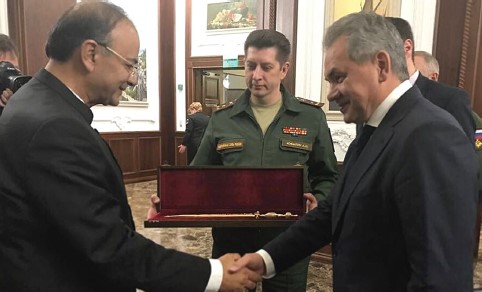
Bilateral Interaction: Rogozin visited India on 20 August 2016. He called on PM Modi and also met the National Security Advisor Ajit Doval during this visit. Rogozin subsequently led a large Russian delegation to the Vibrant Gujarat Summit in January 2017. Doval visited Russia on January 30-31, 2017 and met the Secretary of the Security Council of the Russian Federation, Nikolai Patrushev. They discussed issues of mutual bilateral, regional and global interest, with special focus on security and defence cooperation. India’s Foreign Secretary visited Russia for Foreign Office Consultations on March 16-17, 2017. Deputy NSA visited Russia in March 2017 and met his counterpart for the 17th India- Russia Joint Coordination Group Meeting. He also attended the 4th International Arctic Forum Meeting in Arkhangelsk. Russian Minister for Industry and Trade, Denis Manturov, visited India in March 2017. He jointly inaugurated the International Engineering Sourcing Show 2017 with CIM in Chennai. He later attended the first-ever India- Russia Military Industrial Conference in Delhi on March 17-18, 2017. Russia’s Deputy Prime Minister Yury Trutnev visited India in March 2017. He met the EAM in Delhi, and signed deals worth US $ 1.4 billion during his visit to Mumbai. The Russian side also signed a Term Sheet with TATA Power for developing a coal field in Kamchatka during this visit. Minister of Defence, Finance and Corporate Affairs of India, Arun Jaitley attended the 6th Moscow Conference on International Security on 25-26 April 2017. He also had a bilateral meeting with his Russian counterpart during this visit. He again visited Russia on 21-23 June 2017 and also co-chaired the first ever meeting of the India-Russia High- Level Committee on Science and Technology held in Novosibirsk. NSA Doval visited Russia in May 2017 to attend the 8th International Meeting of High Level Officials Responsible for Security Matters in Zavidovo. He also had a bilateral meeting with his Russian counterpart. R.N. Ravi, Chairman Joint Intelligence Committee, participated in a joint Anti-Terrorist Exercise of the competent Bodies of the Member States of the Shanghai Cooperation Organisation held in Yaroslavl from August 09-11, 2017. Earlier in 2016, the EAM held separate bilateral meetings with DPM Rogozin and Foreign Minister Sergey Lavrov on the sidelines of the 14th Russia- India-China (RIC) Foreign Ministers meeting in Moscow on 18 April 2016.
Speaker of Lok Sabha, Sumitra Mahajan, led a delegation of Members of Parliament of India to Russia for the 4th India-Russia Inter- Parliamentary Commission meeting on 11 July 2017. She met the Chairman of the State Duma (Lower House of the Russian Parliament), Vyacheslav Volodin, and the Chairperson of the Federation Council, Valentina Matvienko, in Moscow. She also addressed the Plenary Meeting of the State Duma in Moscow on 12 July 2017. Volodin visited India in February 2015 and participated in the 3rd Session of the India-Russia Inter-Parliamentary Commission. He also called on the President and Vice President of India. A five member delegation from the Russian Parliament attended the BRICS Womens’ Parliamentary Forum in August 2016. In April 2016, Minister of State for Defence visited Moscow and attended the 5th Moscow Conference on International Security. The Minister of Law and Justice participated in the St Petersburg International Legal Forum in May 2016. In June 2016, Minister of State for Petroleum & Natural Gas participated in the 16th St. Petersburg International Economic Forum (SPEIF), and also met his Russian counterpart. In March 2016, the Russian Minister for Emergency Situations co-chaired the first meeting of the India-Russia Joint Commission for cooperation in preventing emergency situations in New Delhi. A three-member team from NDRF visited Russia for orientation and training at the Russian Civil Defence Academy in April 2017. A number of other exchanges are being discussed in accordance with Joint Implementation Plan.
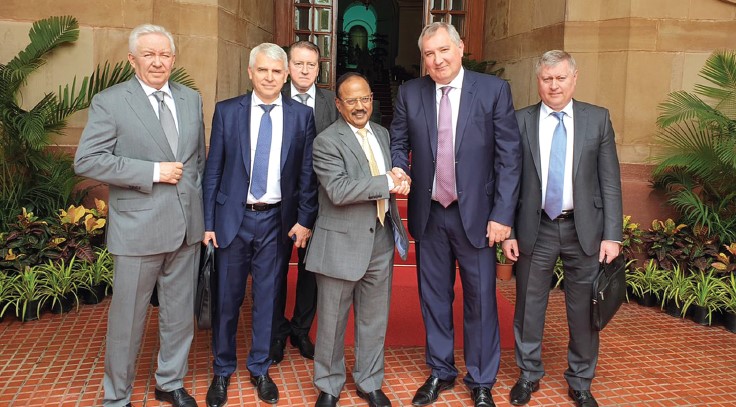
Consultations: Pursuant to the signing of the Protocol for Consultations between the Foreign Ministries, Secretary (West), Secretary (ER) and Secretary (East) visited Russia for bilateral consultations in 2016. Other official level consultations (Secretary/ Joint Secretary) on issues such as disarmament & non-proliferation, Central Asia, European issues, information security, South Asia, UN, BRICS, SCO and RIC were also held in 2016. During the 17th Annual Summit, the sides concluded a Protocol for Consultations between the foreign ministries for the period 2017-18. In 2017, a number of Consultations on issues such as disarmament and non-proliferation, information security, property issues, SCO and counter-terrorism have already taken place in accordance with the new plan.
Defence & Security Cooperation
India has longstanding and wideranging cooperation with Russia in the field of defence. India-Russia military technical cooperation has evolved from a buyer – seller framework to one involving joint research, development and production of advanced defence technologies and systems. BrahMos Missile System as well as the licensed production in India of SU-30 aircraft and T-90 tanks, are examples of such flagship cooperation. During the 17th Annual Summit, the sides concluded agreements on supply of S-400 air defence systems, construction of frigates under Project 1135.6 and shareholders agreement on the formation of joint venture to manufacture Ka-226T helicopters in India. The two countries also hold exchanges and training exercises between their armed forces annually. The joint military exercise ‘Indra 2016’ was held in the Ussuriysk District in Vladivostok from 22 September -02 October 2016. The annual bilateral naval exercise ‘Indra – Navy’ took place off the coast of Vishakhapatnam on 14-21 December 2016. Both sides have also decided to hold the first ever triservices exercised in the year 2017. A roadmap for the development of bilateral defence cooperation was signed during the 17th Meeting of the IRIGC-MTC.
Indian Air Chief Arup Raha visited Russia from 24-29 October 2016. Russian Naval Chief visited India in March 2017. The first ever India- Russia Military Conference took place in Delhi in March 2017. Nearly 45 Russian entities participated in this conference. FSB Director, Alexander Bortnikov led a ninemember delegation to India in March 2017 and called on the Minister of Home Affairs.
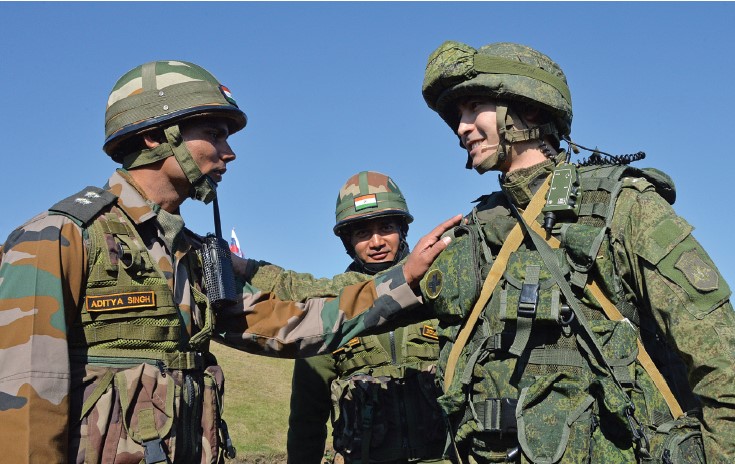
Economic Relations
Making the economic partnership a strong pillar of the bilateral partnership like other areas of cooperation between India and Russia is a key priority for both governments. In December 2014, the leaders of the two countries set a target of US$ 30 billion bilateral trade by 2025. According to Russian Federal Customs Service data, bilateral trade during in 2016 amounted to US$ 7.71 billion (decline of 1.5% over 2015), with Indian exports amounting to US$ 2.39 billion and imports from Russia amounting to US$ 5.32 billion. Major items of export from India include pharmaceuticals, tea, coffee and tobacco, machinery and mechanical appliances, organic chemicals, and electrical machinery and equipment. Major items of import from Russia include pearls, precious and semi-precious stones & metals, nuclear power equipment, electrical machinery and equipment, mineral oil & products, iron & steels, and optical, precision and surgical equipment. India and Russia are exploring various ways for enhancing bilateral trade. A few important steps/projects that could provide a major boost to bilateral trade are: Operationalisation of the ‘Green Corridor’ project between the two countries which has already reached an advanced stage; implementation of the International North- South Transport Corridor, and the signing of an FTA between Indian and the Eurasian Economic Union (EaEU). In December 2016, Eurasian Economic Union (EaEU) approved the decision to start negotiations between India and the EaEU for signing an FTA.
Indian investments in Russia are estimated to be about US$ 13 billion which include Vankorneft and Taas-Yuryakh Tass fields; Imperial Energy Tomsk; Sakhalin I; Volzhsky Abrasive Works Volgograd; and Commercial Indo bank. Russian investments in India total about US$ 16 billion, including the acquisition of the ESSAR Group, Kamaz Vectra in Hosur; Shyam Sistema Telecom Ltd, Sberbank and VTB. Earlier, both sides had expressed their desire to raise the level of investments in each other’s countries to US $ 15 billion (each way) by 2025. Based upon current figures it appears that the target will be achieved almost eight years earlier than planned.

The Inter- Governmental Commission on Trade, Economic, Scientific, Technological and Cultural Cooperation (IRIGC-TEC) is the apex G2G forum to review economic cooperation. It reviews sectoral cooperation under working groups on trade and economic cooperation, priority investments, modernisation and industrial cooperation (subgroups on civil aviation, mining, fertiliser, and modernisation), outstanding issues, energy & energy efficiency, science and technology, communications & IT, tourism and culture, and sub-groups on banking & financial matters and on conservation of tigers & leopards. The 22nd Session of the IRIGCTEC was held in New Delhi on 13 September 2016, which was cochaired by India’s EAM and Russian Deputy Prime Minister Dmitry Rogozin. In 2017, Rogozin visited India for the meeting of Co-Chairs of IRIGC-TEC on May, 2017.
The India-Russia Forum on Trade and Investment co-chaired by the Commerce and Industry Minister of India and the Russian Minister for Economic Development, and India-Russia CEOs’ Council are the two primary mechanisms to promote direct bilateral businessto- business contacts between India and Russia. Mechanisms such as India-Russia Business Council (partnership between FICCI of India and CCI of Russia), India-Russia Trade, Investment and Technology Promotion Council (partnership between CII of India and RUIE of Russia), India-Russia Business Dialogue (partnership between CII of India and Russia’s Business Council for Cooperation with India) and India-Russia Chamber of Commerce (with focus on SMEs) supplement the efforts to build direct businessto- business ties. To promote smoother and greater movement of businessmen, the two countries signed a protocol on 24 December 2015 to simplify visa procedures for businessmen.

Hydrocarbons is an active area for exploring cooperation between the two countries. In the second and third quarter of 2016, Indian companies invested close to US$ 5.5 billion in Russia’s Oil and Gas sector, which included acquisition of 23.9% stake in Vankorneft and 29.9% in Taas-Yuryakh by an Indian Consortium of Indian Oil Corporation Limited (IOCL), Indian Oil Corporation Limited (OIL) and Bharat Petro Resources Limited (BPRL); and acquisition of 15% and 11% stake by ONGC Videsh Limited (OVL) in Vankorneft from Rosneft Oil Company of Russia. During the 17th Annual Summit, the sides concluded documents between Engineers India Ltd and Gazprom on the Joint Study of a gas pipeline to India and other possible areas of cooperation; Agreement in the area of Education and Training between ONGC Videsh Ltd and Rosneft Oil Company; and Programme of Cooperation (PoC) in the Field of Oil and Gas for the period 2017-18; and the Sale and Purchase Agreement between a Rosneft-led consortium and Essar for acquisition of 98% stake in Essar Oil Limited. The Rosneft led Consortium has invested close to US $ 13 billion in this deal. The sides are working towards realisation of an ‘Energy Bridge’ between the two countries, which is based on robust civil nuclear cooperation, LNG sourcing, partnership in the Oil and Gas sector, and engagement in renewable energy sources. Russia’s Deputy Energy Minster Yuri Sentyurin visited India from 27-28 June, 2017 to discuss the possibility of a gas pipeline between India and Russia.
In December 2015, Tata Power signed an agreement with the Russian Ministry of Far East Development for investment projects in energy sector in the region. In October 2016, Indian and Russian railways signed an agreement on high speed rails in India. In December 2015, Heavy Engineering Corporation (HEC), Ranchi concluded agreements with Russian company CNIITMASH on establishing a Centre of Excellence in India and modernisation of HEC’s facilities; and Solar Energy Corporation of India signed an MoU with Russian counterpart for constructing solar plants in India.
India participated in one of Russia’s of major flagship industrial exhibitions, ‘INNOPROM 2016’ in Ekaterinburg (Russia) from 11-14 July 2016 as a partner country, where the Indian delegation was led by Commerce and Industry Minister and the Chief Ministers of Andhra Pradesh, Maharashtra and Rajasthan. They also held a roundtable meeting with the Russian Prime Minister. An export Promotion Council delegation headed by Joint Director Mishikant Jumde, and another CII delegation headed by Srikumar Nair participated in INNOPROM-2017 from Indian side. Minister for Industry and Trade, Denis Manturov, led a large delegation to India and attended the opening ceremony of the BRICS Trade Fair, and met CIM in October 2016. He also met the CMs of Rajasthan, Andhra Pradesh, and Maharashtra.
Nuclear Energy
Russia is an important partner for India in the area of peaceful use of nuclear energy. It recognises India as a country with advanced nuclear technology with an impeccable nonproliferation record. In December 2014, Department of Atomic Energy (DAE) and Russia’s Rosatom signed the Strategic Vision for strengthening cooperation in peaceful uses of atomic energy between India and Russia. Kudankulam Nuclear Power Plant (KKNPP) is being built in India with Russian cooperation. KKNPP Units 1 and 2 have already become operational. PM Modi and President Putin jointly dedicated Units 1 & 2 to the nation on separate occasions through video conferencing. They also initiated the concrete pouring for Units 3 &4 through videoconference on October 15, 2016. An agreement on localisation of manufacturing of nuclear equipment in India was also concluded during the Annual Summit on 24 December 2015. The agreement for KKNPP Units 5 & 6 was concluded during the 18th Annual Bilateral Summit in St. Petersburg in June 2017.

Space Cooperation
India-Russia cooperation in the field of peaceful uses of outer space dates back to about four decades. 2015 marked the 40th anniversary of the launch of India’s first satellite “Aryabhatt” on a Russian (then USSR) launch vehicle ‘Soyuz.’ In 2007, India and Russia signed a framework agreement on cooperation in the peaceful uses of outer space, including satellite launches, GLONASS navigation system, remote sensing and other societal applications of outer space. In June 2015, the space agencies signed an MoU on expansion of cooperation in the field of the exploration and use of outer space for peaceful purposes. An agreement was signed between C-DAC and GLONASS for cooperation in technologies based on satellite navigation. On 15 October 2016, ISRO and Roscosmos signed an MoU to establish ground measurement gathering stations for GLONASS and NAvIC in India and Russia. Both sides are also exploring the possibility of cooperation in manned space flight.
Science & Technology The Working Group on Science and Technology functioning under IRIGCTEC, the Integrated Long Term Programme (ILTP) and the Basic Science Cooperation Programme are the three main institutional mechanisms for bilateral Science and Technology cooperation, while the Science Academies of the two countries promote interacademy exchanges. ILTP during its 25-year long implementation period, supported over 500 joint R&D projects and setting up of 9 thematic centres in India and Russia that resulted in generation of over 1500 joint publications and many new products, processes, facilities, and research centres besides developing over 10,000 scientific contacts. India-Russia Science and Technology Centre with a branch each in Delhi-NCR and Moscow was set up in 2011-12 in order to promote two-way transfer of technologies and their commercialisation.
Two new Programmes of Cooperation in the field of Science, Technology, Innovation, and Biotechnology concluded in October 2013 have become active mechanisms for cooperation. These programmes have already supported the first batch of 11 joint R&D projects in 2014. In December 2014, Indian Council of Medical Research and Russian Foundation of Basic Research entered into an MoU for cooperation in health research. On 8 May 2015, Department of Science & Technology (DST) and Russian Science Foundation signed an agreement to support basic and exploratory research. During the 16th Annual Summit, C-DAC, IISc (Bangalore) and Moscow State University signed an agreement on cooperation in the field of high performance computing. During the 17th Summit, DST and FASO (Federal Agency for Scientific Organisation) signed an agreement for cooperation in the field of science and technology. A Basic Science Cooperation Programme between DST and the Russian Foundation for Basic Research has been working quite successfully from 2016-17. A number of new initiatives such as the Indi- Russia Bridge to Innovation, cooperation in telemedicine, creation of a Traditional Knowledge Digital Library, GIAN, and the Russia-India Network (RIN) of Universities are being promoted to encourage the growth of bilateral interaction in the field of S&T. Prof. Ashutosh Sharma, Secretary, Department of Science and Technology visited Russia from 19-21 June, 2017.
Cultural Cooperation
There is a strong tradition of Indian studies in Russia. Jawaharlal Nehru Cultural Centre at the Embassy of India, Moscow (JNCC) maintains close cooperation with leading Russian institutions, including the Institute of Philosophy (Moscow); Russian State University for Humanities (Moscow); Institute of Oriental Studies (Moscow); Institute of Asian and African Studies of the Moscow State University; School of International Relations of the St. Petersburg University; Institute of Oriental Manuscripts (St Petersburg); Peter the Great Museum of Anthropology & Ethnography (Kunstkamera) in St Petersburg; Far Eastern Federal University (Vladivostok);and Russian Institute for Cultural Research (Krasnodar). There is a Mahatma Gandhi Chair on Indian Philosophy in the Institute of Philosophy, Moscow. About 20 Russian Institutions, including leading universities and schools, regularly teach Hindi to about 1,500 Russian students. Apart from Hindi, languages such as Tamil, Marathi, Gujarati, Bengali, Urdu, Sanskrit and Pali are taught in Russian Institutions. There is strong interest among Russian people in Indian dance, music, yoga and Ayurveda. JNCC conducts classes in yoga, dance, music and Hindi for approximately 500 students every month.
There are regular cultural initiatives to promote people-to-people contacts between India and Russia, including reciprocal Years of Culture. The President of India inaugurated the Year of Indian Culture ‘Namaste Russia’ in Moscow on 10 May 2015. About 15 performances in eight cities were held as part of ‘Namaste Russia’ across various parts of Russia over 2015. The Embassy with support from regional governments organised week-long celebrations marking the third International Day of Yoga (IDY) covering 68 regions spanning 87 locations and involving over 37685 Yoga enthusiasts. During the previous Summit in October, the leaders adopted a ‘Roadmap of Events’ to celebrate the 70th anniversary of the establishment of the diplomatic relations between India and Russia with year-long celebrations in 2017 under which numerous events have already been held in both countries.
Indian Community
The Indian community in the Russia is estimated at about 30,000. In addition, about 1,500 Afghan nationals of Indian origin live in Russia. About 500 Indian businessmen reside in Russia out of which around 200 work in Moscow. It is estimated that about 300 registered Indian companies operate in Russia. Majority of Indian businessmen/companies in Russia are involved in trading. Some entities also represent Indian banks, pharmaceuticals, hydrocarbon and engineering companies. Tea, coffee, tobacco, pharmaceuticals, rice, spices, leather footwear, granite and garments are amongst the products being imported by these companies from India. There are approximately 4,500 Indian students enrolled in medical and technical institutions in the Russian Federation. About 90% of them pursue medical studies in about 20 universities across Russia. Embassy of India School in Moscow is affiliated to Kendriya Vidyalaya Sangathan in New Delhi with teachers deputed from India. The School has classes from I to XII with about 350 students.



